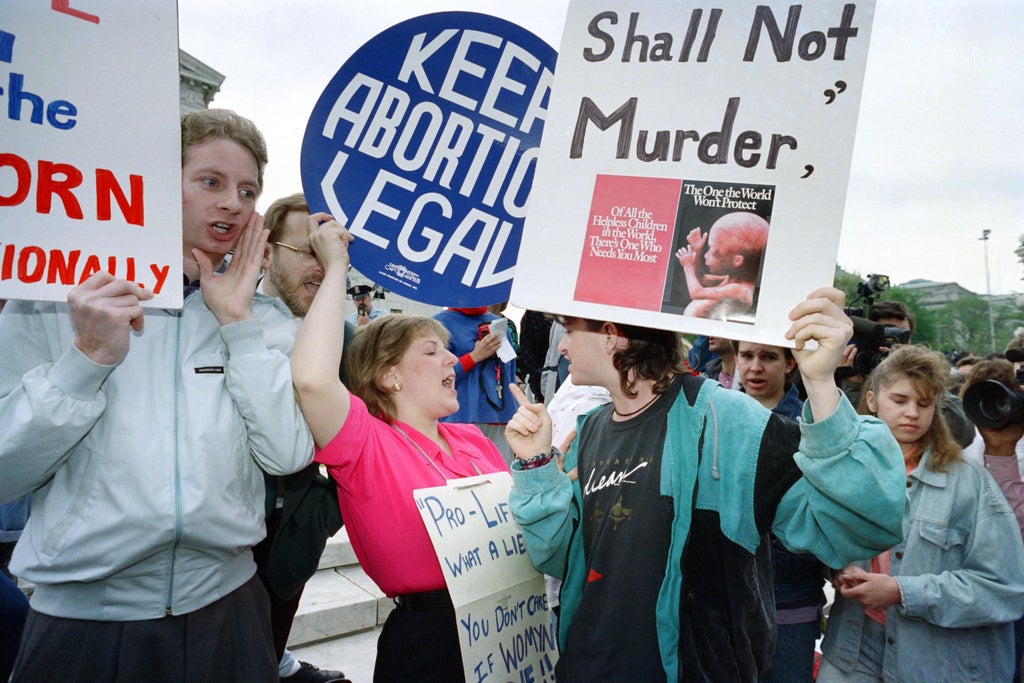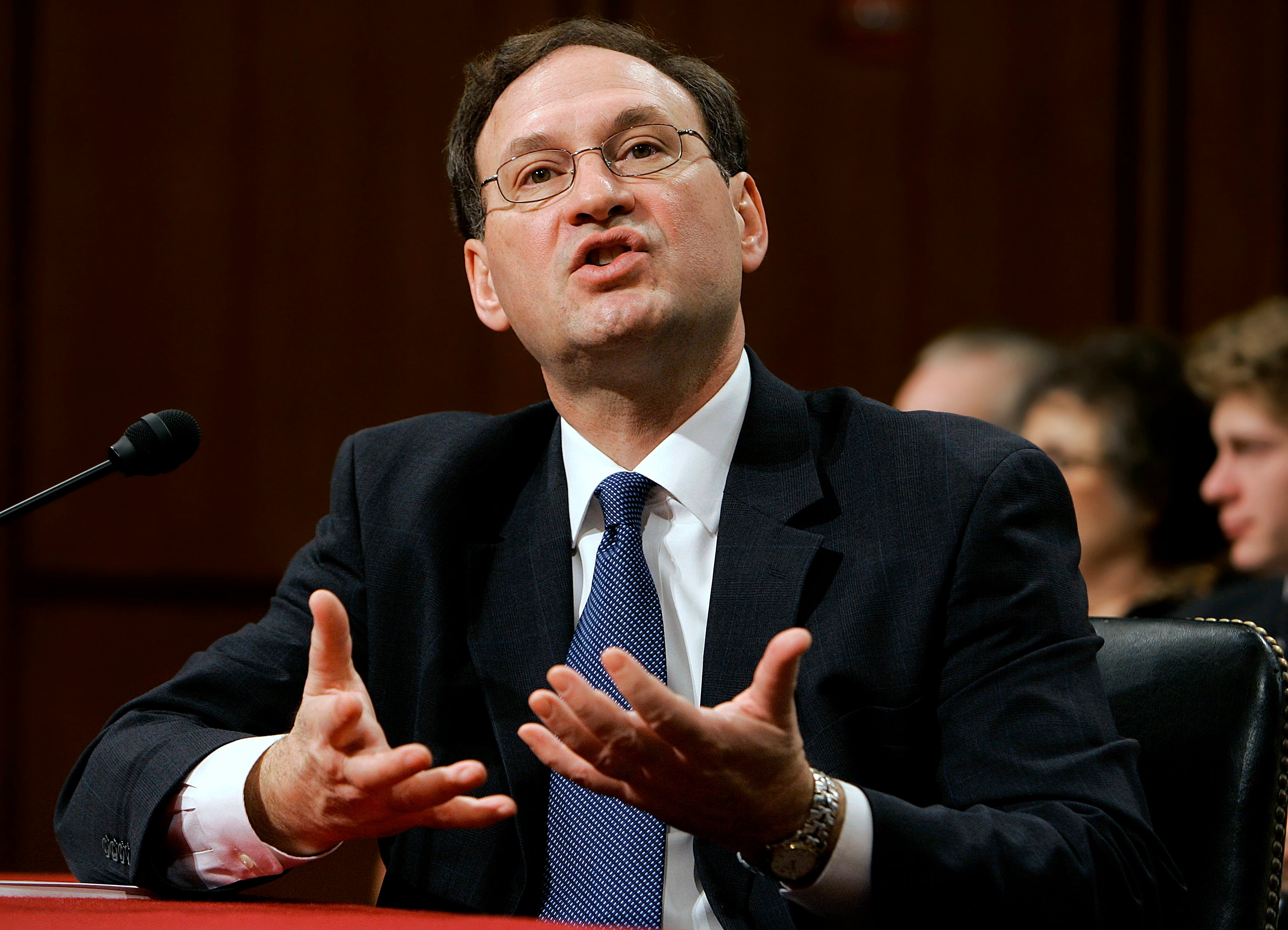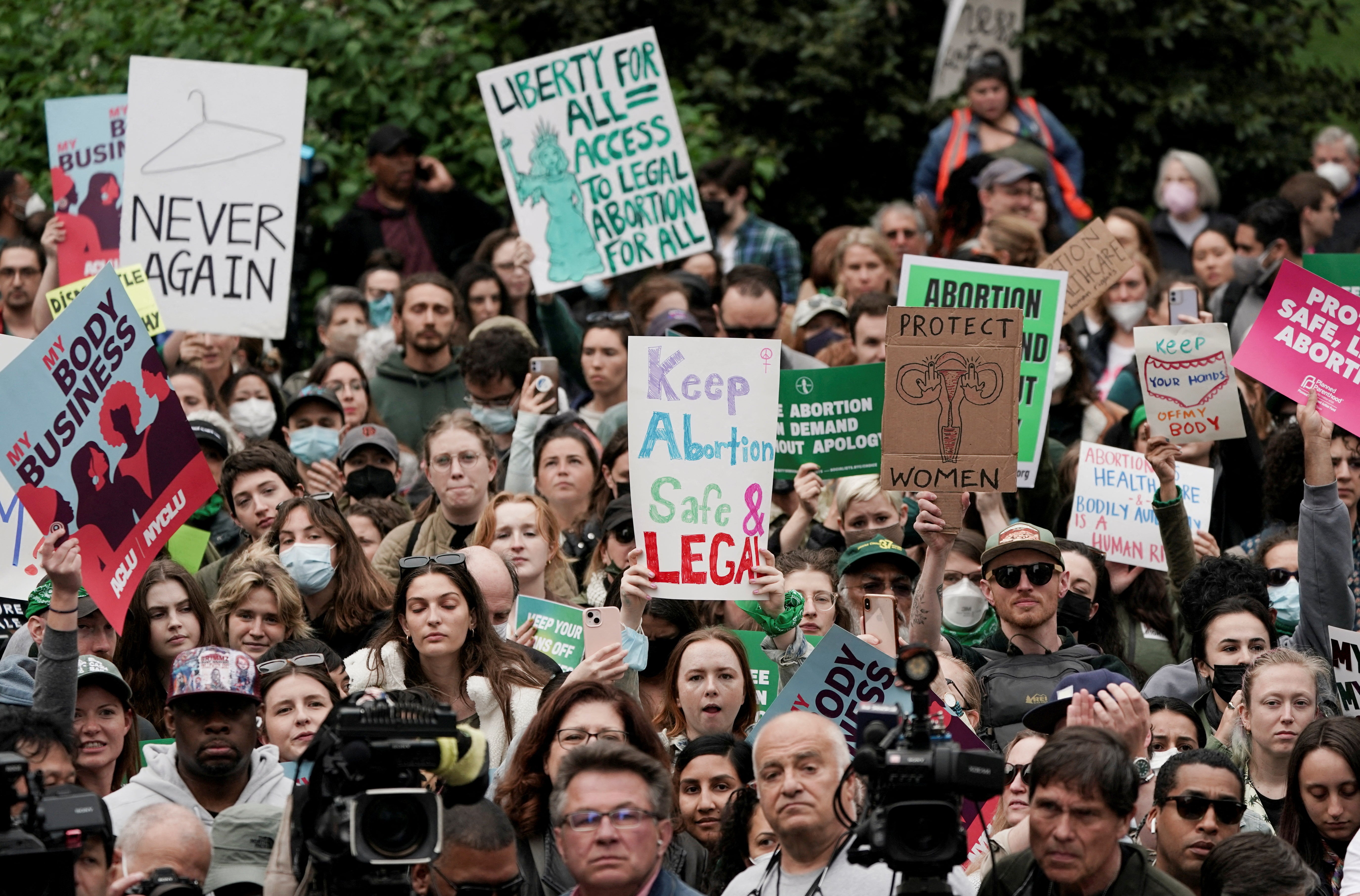
When lawyers for the state of Mississippi defended a state law banning abortion at 15 weeks of pregnancy before the US Supreme Court in 2020, they suggested that the court did not need to overturn Roe v Wade to do so.
One year later, the state’s argument hinged on the question of ending Roe, rejecting precedent that could end constitutional protections for abortion and trigger a wave of laws that make it illegal in more than half the country.
A lot can happen within a year. Longtime liberal Justice Ruth Bader Ginsburg died. Donald Trump named her replacement Amy Coney Barrett, who was confirmed to the Senate in record time before Mr Trump left office.
But getting a case like Mississippi’s in front of a conservative-majority Supreme Court to directly challenge legal abortion has been central to a campaign that was years in the making.
A draft opinion signalling the end of constitutionally protected abortion access in America marks a victory for an anti-abortion movement that has reshaped right-wing politics and helped Republicans stack the federal judiciary with ideologically like-minded figures.
The so-called “pro-life” movement – parallel to and in concert with a growing Christian right and conservative legal groups – has fuelled the Republican Party and waged a campaign to inform “single issue” voters into a powerful base. The movement has helped draft state-level legislation to restrict abortion access and promoted anti-abortion figures across the judicial system, cultivating a conservative majority on the nation’s high court to undo the ruling at the centre of its agenda.
Should the ruling be finalised, it will be seen as a crowning achievement for a minority movement that has spent the last several decades focused on Roe’s demise, despite growing consensus among Americans in support of protecting abortion access.
“It is a victory, and it also poses the more difficult question about what’s next,” Florida State University College of Law professor Mary Ziegler, author of Abortion and the Law in America: Roe v Wade to the Present and forthcoming Dollars for Life: The Antiabortion Movementand the Fall of the Republican Establishment, told The Independent.
“It’s a lot easier to be in the opposition than it is to be the person in a position to actually do something,” she said. “Now you’re going to see anti-abortion groups in the states give us a sense of, ‘What does it actually mean to be pro-life?’ Does it mean you just put people in jail for [performing] abortions or having abortions, or is there more to it than that?”
The “pro-life” movement
The story at the centre of the conservative Christian movement has rallied right-leaning voters for years. But what became a concerted effort to politicise abortion in the wake of the 1973 Supreme Court decision in Roe v Wade developed from a conservative movement in fierce opposition to civil rights progress, one that galvanised conservative Christian groups without invoking race, according to scholars who have traced the history of the movement and its influence.
“The anti-abortion movement has been remarkably successful at convincing observers that the positions individuals take on the abortion issue always follow in a deductive way from their supposed moral principles. They don’t,” Katherine Stewart, author of The Power Worshipers, told The New York Times.
The federal government’s targeting of religious-affiliated private schools evading racial integration in the years after the Supreme Court’s Brown v Board of Education decision in 1954 electrified movement leaders, conceding that “defending the tax advantages of racist schools wasn’t going to be a viable strategy on the national stage,” she said.
Public polling and resolutions issued by religious organisations, including a 1971 plea from the Southern Baptist Convention to support legalising abortion in certain cases, largely maintained the importance of its access, regardless of “moral” questions about its practise.
But in the years leading up to the Roe ruling, conservative movement leaders began to shape an agenda that remains firmly within the American right, from the rhetoric around defining “life” to political platforms resisting federal authority, rooted firmly in Reconstruction-era grievances.
Ten years after the landmark court decision in Roe v Wade, the US Senate failed to pass a proposed constitutional amendment that would ban abortion. In 1984, Americans United for Life convened a national conference to develop a strategy to overturn the ruling.
Over the following decades, the movement spawned dozens of anti-abortion organisations and gained outsized influence within state legislatures, under direction of “family”-focused religious groups, while mobilising “pro-life” supporters in schools, outside abortion clinics, and in the streets of Washington DC.
Meanwhile, the newly formed Federalist Society took aim at what it believed was the Supreme Court’s “judicial activism” and began a decades-long effort to reshape the federal judiciary and the lawmakers behind it, transforming into a powerful presence in Washington with six current or former members on the Supreme Court.
“The Christian right and the anti-abortion movement are obviously connected, but the anti-abortion movement is sort of its own thing – it’s a truly single-issue movement in some ways,” Ms Ziegler told The Independent. “The conservative legal movement, the Federalist Society, and sort of the ‘elite wing’ of the movement [is] distinct. There’s a lot of overlap in the sense that all three of those constituencies want Roe overturned and have worked toward that goal for a while, but they’ve sometimes had complicated relationships with one another. … Like most social movements, there’s more complexity than that.”
The Trump administration
President Trump, with a Republican-controlled Senate under Mitch McConnell and input from the Federalist Society, appointed 54 federal appellate judges in just four years – nearly as many as those appointed by Barack Obama but in just half the time. With his rapid appointments, the former president “flipped” the balance of several appeals courts through which major cases are reviewed before consideration in front of the Supreme Court.
Mr Trump’s appointments to the Supreme Court – Neil Gorsuch, Brett Kavanaugh and Amy Coney Barrett – are the most within any president’s administration since Ronald Reagan, and the most by any one-term president.
In 2019, then-Senate Majority Leader McConnell said “the most important decision” in his political career was blocking efforts to fill a Supreme Court vacancy following the death of Justice Antonin Scalia during Barack Obama’s administration.
The Senate denied hearings for Mr Obama’s nominee Merrick Garland – now the US attorney general – for a record 293 days, arguing that the 2016 presidential election precluded any talk of a nominee. And just a few weeks after Trump’s inauguration in January 2017, that vacancy was filled by his nominee, Neil Gorsuch.
Mr McConnell abandoned the “rule” in what were the final days of the Trump administration, with the Senate confirming Justice Barrett just 38 days before Election Day.
Ms Ziegler, writing in The Atlantic earlier this year, said the GOP and Federalist Society “have created a parallel community with its own norms and sources of validation” in which Supreme Court justices “may not worry about losing legitimacy in one elite legal circle when they will be heroes in another.”
Roe v Wade’s journey to get to the Supreme Court not only fulfills the “Christian right’s decades-long ambition of overturning Roe but very explicitly gives them license to enact the harshest regime they can imagine to defend what they claim are the biblical values of a Christian nation,” according to Sarah Posner, author of Unholy: Why White Evangelicals Worship at the Altar of Donald Trump.
“It creates a post-Roe world in which state legislatures feel more empowered to escalate their attacks not only on reproductive rights but on [LGBT+] rights as well,” she said.
The Mississippi case
In 2018, Mississippi’s only abortion clinic sued the state one day after passage of the Gestational Age Act banning abortion at 15 weeks of pregnancy.
A US district judge initially ruled in Dobbs v Jackson Women’s Health Organization that the state has “no legitimate state interest strong enough, prior to viability, to justify a ban on abortions” before 23 or 24 weeks of pregnancy. An appeals court ruling upheld that decision, asserting that states “may not ban abortions”.
In Mississippi’s initial filing with the Supreme Court in 2020, the state initially proposed three questions to the court – none of which mention Roe. One year later, the state’s argument came down to a single question: “Whether all pre-viability prohibitions on elective abortions are unconstitutional.”
Mississippi Attorney General Lynn Fitch argued that “the conclusion that abortion is a constitutional right has no basis in text, structure, history, or tradition,” a statement echoed in anti-abortion arguments and in Justice Samuel Alito’s leaked opinion.
“Today, adoption is accessible and on a wide scale women attain both professional success and a rich family life, contraceptives are more available and effective, and scientific advances show that an unborn child has taken on the human form and features months before viability,” Ms Fitch claimed in a filing with the court. “States should be able to act on those developments. But Roe and Casey shackle states to a view of the facts that is decades out of date.”
A strategy to defend the law against Roe and Casey started years earlier. The anti-abortion Evangelicals For Life Conference in Washington DC in 2018, which featured speakers from the conservative legal group Alliance Defending Freedom (ADF), hailed a new legal strategy within state legislatures to reverse the Roe ruling.
Days later, Republican legislators in Mississippi filed identical version of the Gestational Age Act, drafted by the ADF, to force abortion rights groups into a legal challenge that would eventually land at the Supreme Court.
Justice Alito’s opinion
The case at the centre of the 1992 ruling in Planned Parenthood v Casey involved Pennsylvania’s Abortion Control Act, which required abortion patients to wait 24 hours from their initial appointment, parental consent for minors seeking abortion care, and for patients to notify their spouses.
Planned Parenthood was among opponents of the law who sued the state, arguing that law drafted unconstitutional restrictions against those protected by the Roe standard.
Before the case reached the Supreme Court, Mr Alito – who was then a federal appeals court judge – argued that the law’s spousal notification requirement should stay in place, writing that “some married women are initially inclined to obtain an abortion without their husbands’ knowledge because of perceived problems – such as economic constraints, future plans, or the husband’s previously expressed opposition – that may be obviated by discussion prior to the abortion.”
The Supreme Court ultimately rejected his argument and declined to use the case as a means to overturn Roe, with Justices Sandra Day O’Connor, Anthony Kennedy and David Souter writing that “an entire generation has come of age free to assume Roe’s concept of liberty in defining the capacity of women to act in society and to make reproductive decisions.”

The ruling established the “undue burden standard” for laws restricting abortion access, holding that states cannot pass their own laws restricting abortion access except if such laws create “a substantial obstacle” for a patient to access care under the “essential holding” established by Roe.
In 2005, Harriet Miers – nominated to the Supreme Court by then-president George W Bush following the retirement of Justice O’Connor – withdrew her nomination.
In her place, Mr Bush nominated Samuel Alito.
Nearly 20 years later, Justice Alito authored the draft of the Dobbs ruling to overturn both Roe and Casey in an opinion that echoes several long-running talking points and legal arguments among anti-abortion movement figures and legal groups, according to Ms Ziegler.
Justice Alito points to what he calls “an unbroken tradition of prohibiting abortion on pain of criminal punishment persisted from the earliest days of the common law until 1973,” which critics have argued is both an ahistorical analysis and one that ignores the last five decades of abortion care.
“There’s a lot of disputed history about when was abortion viewed as a crime, what were the motives of the people who criminalized abortion in the 19th century – a lot of that is taken from the research done by anti-abortion scholars,” Ms Ziegler told The Independent. “And it’s not to say that some of those scholars are completely wrong. It’s that there’s no nuance in the opinion. … ‘People who are criminalizing abortion had no bad motives, and abortion [was] illegal throughout pregnancy everywhere’ – that’s just not true.”
The opinion also states that abortion rights are not “rooted in the Nation’s history and tradition” and not “mentioned” in the Constitution, therefore illegitimate, though that list, which even Justice Alito acknowledges, is extensive – including the right to obtain contraception or marry a person of another race or sex.
“The opinion makes the argument that Roe v Wade distorted other aspects of American jurisprudence, that it didn’t just mess up the rules on abortion, but it it messed up the way the law treats a lot of other topics, even procedural issues … what folks in the pro-life movement will call the ‘abortion distortion’ argument,” according to Ms Ziegler.

His argument suggests Roe has inflamed political divides, painting anti-abortion proponents as victims within a long-running culture war who “could no longer seek to persuade their elected representatives to adopt policies consistent with their views” despite Republican dominance among state legislatures.
Justice Alito’s characterisation invokes the idea within the anti-abortion movement that “what’s wrong with American politics somehow has to do with Roe – all of those are things that the pro-life movement has been working on at least since the ‘90s and sometimes since the ‘70s,” Ms Ziegler said.
The future of the movement
Movement leaders now must wrestle with competing visions of what it means to be “pro-life” in an era without Roe, as Republican legislators emboldened by the potential end of constitutional protections for abortion care look to criminalise patients while gutting social safety nets, according to Ms Ziegler.
“Do they mean IUDs, birth control pills? What are they going to do about people who self-manage abortions? What are they going to do about people who travel out of state?” Ms Ziegler said.
“I think that may be bad for the brand and the pro-life movement [if it] increasingly becomes the new mass incarceration movement,” she told The Independent. “The stakes of that conversation are getting higher, because before it was kind of academic, where you could have the governor have one vision of what it means to oppose abortion, and you could have the legislature have another vision, and nobody really got anything, because it would be struck down as unconstitutional. But now, whoever wins actually gets to implement the policy.”







